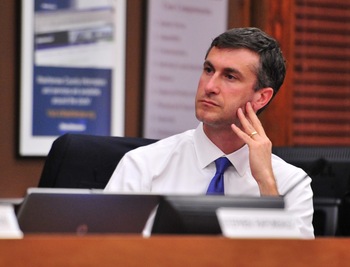On balance, I believe that the future of Ann Arbor is bright.
Accentuating the positive, our indispensable strategic asset is secure and growing; our community is replete with talent and civic engagement; and the municipal organization is efficient and sustainable.
Clik here to view.

Christopher Taylor, the author of this guest column, at a council meeting.
Ryan J. Stanton | AnnArbor.com
With particularity, Ann Arbor is home to the University of Michigan, commonly ranked among the top 25 universities in the world. The UofM is an enduring institution that grows and improves year in, year out while Ann Arbor reaps the economic and cultural benefits. The U of M will never leave town, never shutter the factory, never merge with a competitor. Our relationship with the U of M is not perfect, but the University will generate rock steady employment, provide compelling arts and entertainment, and offer personal and professional opportunities in Ann Arbor for the foreseeable future and far, far beyond.
Ann Arbor’s residents - its human capital - comprise one of its most valuable resources. We boast one of the nation’s most educated and engaged populations. Our neighborhoods and the residents they reflect are vital. Our reputation for and history of social justice and, for want of a better word, decency, is wide spread and well earned. This base, generally speaking, means that our residents will continue to start vibrant companies, drive innovation in existing organizations, and provide cultural, civic, and economic leadership for years to come. It also creates a political culture that responds well to information and from which we can draw scores of talented, committed persons to serve Ann Arbor in a range of capacities.
The municipal organization has for many years now been run by deeply qualified, committed Staff and led by a set of political leaders - preceding me - that has been visionary in right-sizing the organization and focusing doggedly on creating a sustainable, flexible, service-driven enterprise. The job is not done, it can never truly be completed, but it has over the years become the way we do business. This ethos will help us build on our own successes and lay the ground work for the success of others.
On the other side of the ledger, it is important to recognize that our ability to exploit these advantages is potentially limited by state, regional, and local factors, all too often outside of our control.
We live in an economically and politically challenged state. Michigan’s political culture has for years now driven us to become a low-service state that cabins cities’ ability to solve local problems and provide exemplary municipal services; systematically diminishes support of public and higher education; and deemphasizes and underresources long-standing infrastructure needs.
Southeast lower Michigan’s economic challenges and political dysfunction are self-evident. The near collapse of the auto industry has been avoided, but it is still a region finding its way, hindered by a dominant urban center that has been for decades synonymous with crime, decay, and corruption. There is undoubtedly a growing and hopeful counter-narrative, but a real turn-around is not imminent.
Within Ann Arbor, too, our history of civic success occasionally serves to check our community’s readiness to embrace and plan for change. Not all proposals are good, not all plans will succeed, but we as a community must, I believe, become even more flexible, more open to change and we must learn to better accept the inevitable errors and course corrections that we all make when wading into the unknown.
These obstacles have the potential to weigh us down, to neutralize our advantages. In the end, however, they will not do so. The growth, excellence, and critical mass of the University of Michigan; the energy, creativity, and civic commitment of our residents; and the professionalism of our municipal organization will continue to combine to create a quality of life that is matched by few. It will be sufficient to succeed.
On balance, I believe that the future of Ann Arbor is bright.
(Christopher Taylor serves on Ann Arbor City Council, representing the city's 3rd Ward. He sent this to constituents in mid-December.)